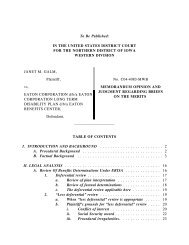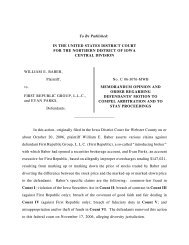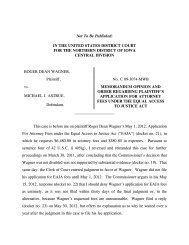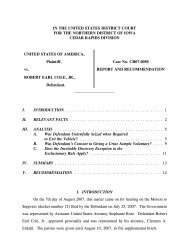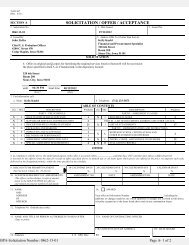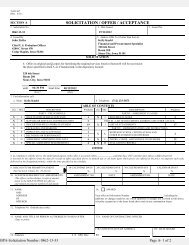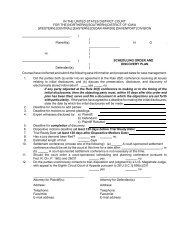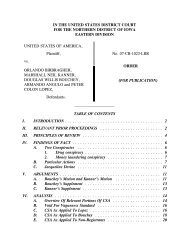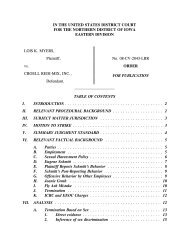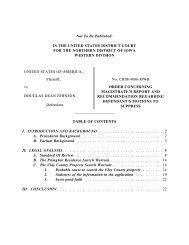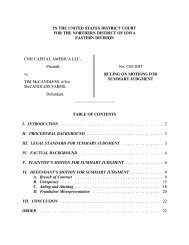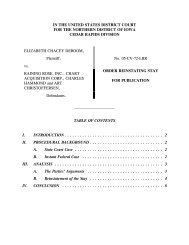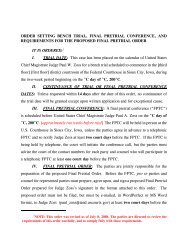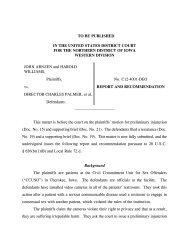Shannon v. Koehler - Northern District of Iowa
Shannon v. Koehler - Northern District of Iowa
Shannon v. Koehler - Northern District of Iowa
Create successful ePaper yourself
Turn your PDF publications into a flip-book with our unique Google optimized e-Paper software.
Nevertheless, <strong>Shannon</strong>’s argument under Rule 403 that the conviction is highly<br />
prejudicial and may confuse the jury is well taken. The conviction for interference with<br />
<strong>of</strong>ficial acts only relates to <strong>Shannon</strong>’s acts while <strong>Koehler</strong> cuffed him. It proves nothing<br />
about how <strong>Shannon</strong> acted before <strong>Koehler</strong>’s leg sweep. The jury in this case could hear<br />
“interference with <strong>of</strong>ficial acts” and conclude that <strong>Shannon</strong> interfered with all <strong>of</strong> <strong>Koehler</strong>’s<br />
<strong>of</strong>ficial acts on September 13, 2006. Additionally, the parties must avoid a mini-trial on<br />
<strong>Shannon</strong>’s criminal conviction that will waste the jury’s and the court’s time. I have<br />
determined that the best way to address the serious potential for prejudice, confusion, and<br />
wasting <strong>of</strong> time is with a limiting instruction. See FED. R. EVID. 403, Advisory<br />
Committee Notes (explaining that a court should consider whether a limiting instruction<br />
could be effective when determining whether unfair prejudice will result). Thus, the<br />
conviction is admissible but only with a limiting instruction.<br />
Because <strong>Shannon</strong>’s charges and convictions are admissible, I turn now to whether<br />
his acquittals are admissible. The general rule is that an acquittal is not admissible to<br />
prove facts upon which the acquittal was based:<br />
10 (...continued)<br />
underlying fact in the civil suit, it easily could and presumably would have so indicated.”<br />
See Dettman, 613 N.W.2d at 249. <strong>Shannon</strong> was convicted under <strong>Iowa</strong> Code § 719.1,<br />
which likewise provides no protection against use in civil proceedings. See IOWA CODE<br />
§ 719.1. Therefore, I conclude that <strong>Iowa</strong> law supports the Eighth Circuit Court <strong>of</strong><br />
Appeals’s conclusion in Grant. See Grant, 869 F.2d at 1151; see also Graack v. Borough<br />
<strong>of</strong> Nazareth, 852 F. Supp. 370, 371-72 (E.D. Pa. 1994) (concluding that the plaintiff’s<br />
convictions for disorderly conduct and resisting arrest arising from the alleged excessive<br />
force incident were admissible in the subsequent § 1983 case because, applying Allen, the<br />
convictions would have been admissible under Pennsylvania law, which allows<br />
convictions, other than traffic <strong>of</strong>fenses, to be used as evidence in subsequent civil<br />
proceedings).<br />
26



